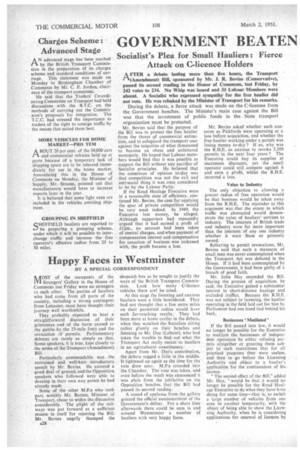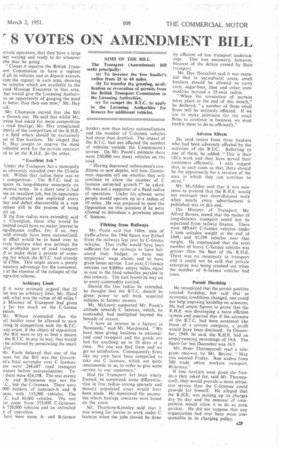GOVERNMENT BEATEN r 8 VOTES ON AMENDMENT BILL
Page 30

Page 31

If you've noticed an error in this article please click here to report it so we can fix it.
Socialist's Plea for Small Hauliers : Attack on C-licence Holders
AFTER a debate lasting more than five hours, the Transport (Amendment) Bill, sponsored by Mr. J. R. Bevins (Conservative), passed its second reading in the House of Commons, last Friday, by
242 votes to 234. No Whip was issued and 39 Labour Members were absent. A Socialist who expressed sympathy for the free haulier did not vote. He was rebuked by the Minister of Transport for his remarks.
During the debate, a fierce attack was made on the C-licensee from the Government benches. The Minister's main case against the Bill was that the investment of public funds in the State transport organization must he protected.
Mr. Bevins said that the purpose of the Bill was to protect the free haulier from the threat of commercial extinction, and to safeguard the transport user against the iniquities of what threatened to become an obese and unfettered monopoly. He hoped that Labour members would find that it was possible to support the Bill without any sacrifice of Socialist principles. He believed that the consensus of opinion to-day was that competition was not the evil and anti-social thing it was once considered to be by the Labour Party.
If the Road Haulage Executive were in a reasonable state of efficiency, continued Mr. Bevins, the case for applying the spur of private competition would be very weak indeed. In 1949, the Executive lost money, he alleged. Although supporters had repeatedly argued that it had earned a profit of film., no account had been taken of central charges, and when payment of compensation interest and compensation for cessation of business was reckoned with, the profit became a loss, Mr. Bevins asked whether such concerns as Pickfords were operating at a loss before acquisition, and whether the free haulier working under a permit was losing money to-day ? If so, why was the R.H.E. so anxious to revoke 5.300 permits in the next four years ? The Executive could buy its supplies at maximum discounts, yet the small operator could, still compete against it and earn a profit, whilst the R.H.E. incurred a loss.
Value to Industry
The only objection to allowing a greater radius of free operation would be that business would be taken away from the R.H.E. The rejoinder to this argument was that the extent to which traffic was abstracted would demonstrate the value of hauliers' services to industry. The interests of British trade and industry were far more important than the interests of any one industry whether it were State or privately owned.
Referring to permit revocations, Mr. Bevins said that such a massacre of small men was never contemplated when the Transport Act was debated in the House. If it had been contemplated by the Government, it had been guilty of a breach of good faith.
Mr. John Hay seconded the Bill. During the process of acquisition, he said, the Executive gained a substantial interest in short-distance haulage and excluded traffics. Because the R.H.E. was not subject to licensing, the haulier operating in the field laid out for him by Parliament had one hand tied behind his back.
Businesses 'Mutilated'
If the Bill passed into law, it would no longer be possible for the Executive to mutilate the businesses of independent operators by either refusing permits altogether or granting them subject to such restrictions that for all practical purposes they were useless, and then to go before the Licensing Authority and object to a haulier's application for the continuation of his licence.
"The second effect of the Bill," added Mr. Hay, "would be that it would no longer be possible for the Road Haulage Executive to do what they have been doing for some time—that is, to switch a large number of vehicles from one area to another temporarily, with the object of being able to show the Licensing Authority, when he is considering applications for renewal of licences by
irivate operators, that they have a large leet waiting and ready to do whatever obs may be going.
"Clause 4 requires the British Transloft Commission to have a register 4 all its vehicles and to deposit extracts rom the register in each area, showing he vehicles which are available to the load Haulage Executive in that area. hat would give the Licensing Authories an opportunity of gauging the need sr better than they can now," Mr. Hay Mr. Champion moved that the Bill e thrown out. He said that whilst Mr. ;evins had asked for more competition t road haulage, Mr. Hay complained itterly of the competition of the R.H.E. t a field which should be exclusively at of free hauliers. He alleged that Ir. Hay sought to reserve the most rofitable work for the private operator id to let the R.H.E. do the other.
"Excellent Job" Under the Transport Act a monopoly as obviously intended over the 25-mile nit. Within that radius there was to competition. The B.T.C. had to :quire its long-distance monopoly on :nerous terms. In a short time it had ine an excellent job, but its opponents id emphasized and exploited every :lay and defect discoverable in a vast isiness still in the process of being lilt up.
If the free radius were extended, said r. Champion, those who would be Imitted could have no major interest in ng-distance traffics, for, if so, they suld already have been nationalized. se effect would be to hand over to ivate hauliers what was perhaps the nst profitable part of road transport d to make them a present of someing for which the B.T.C. had already Id L70m. This might secure a purely nporary advantage for the consumer, t at the expense of the collapse of the egration scheme.
Arbitrary Limit If it were seriously argued that 25 les was an arbitrary limit, Mr. Hynd ced, what was the virtue of 60 miles ?
e Minister of Transport had given y far too much on the C-licence estion.
Mr. Wilson contended that the all haulier must be allowed to earn iving in competition with the B.T.C. any event, if the object of opposition the Bill were to try to find a means the B.T.C. to pay its way, that would be achieved by persecuting the small slier.
dr. Poole believed that one of the sons for the Bill was the Governnt's fatal surrender over C licences, ere were 248,687 road transport :raters before nationalization. To there were 424,198. The real enemy Aand B-licensees was not the '.C., but the C-licensee. There were 000 holders of contract-A and B nces with 119,000 vehicles. The '.C. had 40,000 vehicles. The real :at came from 373,000 C-licensees h 720,000 vehicles and an unlimited I of operation.
-here were more Aand B-licence
holders now than before nationalization and the number of C-licence vehicles had more than doubled. The impact of the B.T.C. had not affected the number of vehicles outside the Commission's service. On Mr. Poole's estimate there were 250,000 too many vehicles on the road.
"Having depressed railwaymen's conditions to new depths, will hon. Gentlemen opposite tell me whether they will continue to allow the number of C licences unlimited growth ?" he asked. He was not a supporter of a fixed radius of operation. Under his scheme some people would operate up to a radius of 10 miles. He was prepared to meet the Opposition on this question if he were allowed to introduce a provision about C licences.
Filching from Railways
Mr. Poole said that 140m. tons of traffic,above the 1946 figure was filched from the railways last year by C-licence vehicles. That traffic would have been sufficient for the railways to have balanced their budget, to have met employees' wage claims and to have given better service. Last year, C-licence vehicles ran 8,000m. empty miles, equal in cost to the food subsidies payable in this country. The cost found its way on to every commodity carried.
Should the free radius be extended, he thought that the B,T.C. should be given power to sell back acquired vehicles to former owners.
Mr. McLeavy supported Mr. Poole's attitude towards C licences, which, he contended, had multiplied beyond the bounds of reason.
"1 have an interest in a factory at Newcastle," said Mr. Macdonald. "We have been giving business to nationalized road transport and the goods are lost for anything up to 10 days at a time. No one can find them and we get no satisfaction. Consequently, firms like my own have been compelled to take out C licences, which are quite uneconomic to us, in order to give some service to our customers."
Had the Transport Act been wisely framed, he continued, some differentiation in free radius among sparsely and densely populated areas would have been made. He mentioned the anomalies where haulage concerns were based on the coast.
Mr. Thornton-Kemsley said that it was wrong for lorries to work under C licences when the jobs should be done by efficient ad hoc transport undertakings. This was necessary, however, because of the delays caused by State transport.
Mr, Dye (Socialist) said it was essential that in agricultural areas, small hauliers should be allowed to carry corn, sugar-beet, lime and other commodities beyond a 25-mile radius.
"When the revocation of permits takes place at the end of this month," he declared, "a number of these small firms will be seriously affected. If we are to make prOvision for the small firms to continue in business, we Must enable them to do so efficiently."
Adverse Effects He read letters from three hauliers who had been adversely affected by the activities of the B.T.C. Referring to one of them, he added: "This is their life's work and they have served their customers efficiently. I only suggest that, in such cases as that, there should be the opportunity for a revision of the area in which they can continue to serve."
Mr. McAdden said that it was nonsense to pretend that the R.H.E. would not encroach into short-distance work when nearly every advertisement it published was to this end.
The Minister of Transport, Mr. Alfred Barnes, stated that the matter of long-distance transport could not be separated from railway finance. There were 689,645 C-licence vehicles under 3 tons unladen weight at the end of 1949, and 43,399 vehicles over that weight. He emphasized that the total number of heavy C-licence vehicles was greater than the fleet of the R.H.E. There was no monopoly in transport and it could not be said that 'private enterprise was being crushed out when the number of A-licence vehicles had risen. Permit Hardship .
He recognized that the permit position created hardship, but said that as economic conditions changed, one could not help imposing hardship on someone. He had ample figures to prove that the R.H.E_ was developing a more efficient system and asserted that if the accounts of the B.T.C. had been presented like those of a private company, a profit would have been disclosed. In December, 1949, he said, the R.H.E. had an empty-running percentage of 19.8. The figure for last December was 16.9.
Mr. Peter Thomeycroft read a telegram received by Mr. Bevins: "May you succeed Friday. Best wishes from 300 trade uftion workers transport. Billericay."
If free hauliers were given the freedo.n they asked for, said Mr. Thorneycroft, they would provide a more attractive service than the C-licensee could provide for himself. He alleged that the R.H.E, was putting up its charges day by day and the removal of competition would allow it to do so even quicker. He did not suppose that any organization had ever been more irresponsible, in its charging •policy.




























































































